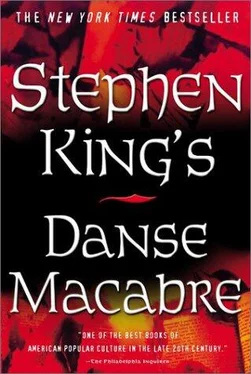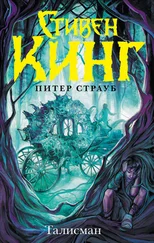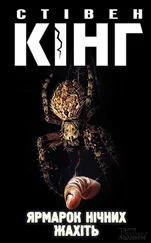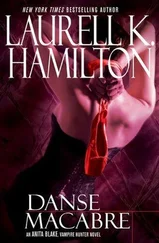Stephen King
Danse Macabre
It’s easy enough-perhaps too easy- to memorialize the dead. This book is for six great writers of the macabre who are still alive.
ROBERT BLOCH
JORGE LUIS BORGES
RAY BRADBURY
FRANK BELKNAP LONG
DONALD WANDREI
MANLY WADE WELLMAN
Enter, Stranger, at your Riske: Here there be Tygers.
THIS BOOK is in your hands as the result of a telephone call made to me in November of 1978. I was at that time teaching creative writing and a couple of literature courses at the University of Maine at Orono and working, in whatever spare time I could find, on the final draft of a novel, Firestarter , which will have been published by now. The call was from Bill Thompson, who had edited my first five books ( Carrie, 'Salem's Lot, The Shining, Night Shift, and The Stand ) in the years 1974-1978. More important than that, Bill Thompson, then an editor at Doubleday, was the first person connected with the New York publishing establishment to read my earlier, unpublished work with sympathetic interest. He was that all-important first contact that new writers wait and wish for . . . and so seldom find.
Doubleday and I came to a parting of the ways following The Stand , and Bill also moved on-he became the senior editor at Everest House, whose imprint you will find on the volume you now hold.
Because we had become friends as well as colleagues over the years of our association, we stayed in touch, had the occasional lunch together . . . and the occasional drinking bout as well. The best one was maybe during the All-Star baseball game in July of 1978, which we watched on a bigscreen TV over innumerable beers in an Irish pub somewhere in New York. There was a sign over the backbar which advertised an EARLY BIRD HAPPY HOUR, 8-10 A.M. with all drinks priced at fifty cents. When I asked the barkeep what sort of clientele wandered in at 8:15 A.M. for a rum collins or a gin rickey, he fixed me with a baleful smile, wiped his hands on his apron, and said: "College boys . . . like you.” But on this November night not long after Halloween, Bill called me and said, "Why don't you do a book about the entire horror phenomenon as you see it? Books, movies, radio, TV, the whole thing.
We'll do it together, if you want.” The concept intrigued and frightened me at the same time. Intrigued because I've been asked time and time again why I write that stuff, why people want to read it or go to the flicks to see it-the paradox seeming to be, why are people willing to pay good money to be made extremely uncomfortable? I had spoken to enough groups on the subject and written enough words on the subject (including a rather lengthy foreword to my collection of short stories, Night Shift ) to make the idea of a Final Statement on the subject an attractive one. Forever after, I thought, I could choke off the subject by saying: if you want to know what I think about horror, there's this book I wrote on the subject. Read that. It's my Final Statement on the clockwork of the horror tale.
It frightened me because I could see the work stretching out over years, decades, centuries. If one were to begin with Grendel and Grendel's mum and work up from there, even the Reader's Digest Condensed Book version would encompass four volumes.
Bill's counter was that I should restrict myself to the last thirty years or so, with a few side trips to explore the roots of the genre. I told him I would think about it, and I did. I thought about it hard and long. I had never attempted a book-length nonfiction project, and the idea was intimidating. The thought of having to tell the truth was intimidating. Fiction, after all, is lies and more lies . . . which is why the Puritans could never really get behind it and go with the flow. In a work of fiction, if you get stuck you can always just make something up or back up a few pages and change something around.
With nonfiction, there's all that bothersome business of making sure your facts are straight, that the dates jibe, that the names are spelled right . . . and worst of all, it means being out front. A novelist, after all, is a hidden creature; unlike the musician or the actor, he may pass on any street unremarked. His Punch-and-Judy creations strut across the stage while he himself remains unseen.
The writer of nonfiction is all too visible.
Still, the idea had its attractions. I began to understand how the loonies who preach in Hyde Park ("the nutters," as our British cousins call them) must feel as they drag their soapboxes into position and prepare to mount them. I thought of having pages and pages in which to ride all my hobbyhorses-"And to be paid for it!' he cried, rubbing his hands together and cackling madly. I thought of a lit class I would be teaching the following semester titled Themes in Supernatural Literature. But most of all I thought that here was an opportunity to talk about a genre I love, an opportunity few plain writers of popular fiction are ever offered.
As for my Themes in Supernatural Literature course: on that November night Bill called, I was sitting at the kitchen table with a beer, trying to dope out a syllabus for it . . . and musing aloud to my wife that I was shortly going to be spending a lot of time in front of a lot of people talking about a subject in which I had previously only felt my way instinctively, like a blind man. Although many of the books and films discussed in the pages which follow are now taught routinely in colleges, I read the books, saw the films, and formed my conclusions pretty much on my own, with no texts or scholarly papers of any type to guide my thoughts. It seemed that very shortly I would get to see the true color of my thoughts for the first time.
That may seem a strange phrase. Further along in this book I have written my belief that no one is exactly sure of what they mean on any given subject until they have written their thoughts down; I similarly believe that we have very little understanding of what we have thought until we have submitted those thoughts to others who are at least as intelligent as ourselves. So, yeah, I was nervous at the prospect of stepping into that Barrows Hall classroom, and I spent too much of an otherwise lovely vacation in St. Thomas that year agonizing over Stoker's use of humor in Dracula and the paranoia quotient of Jack Finney's Body Snatchers .
In the days following Bill's call, I began to think more and more that if my series of talks (I don't quite have balls enough to call them lectures) on the horror-supernatural-gothic field seemed well received-by myself as well as by my students-then perhaps writing a book on the subject would complete the circle. Finally I called Bill and told him I would try to write the book. And as you can see, I did.
All this is by way of acknowledging Bill Thompson, who created the concept of this book. The idea was and is a good one. If you like the book which follows, thank Bill, who thought it up. If you don't, blame the author, who screwed it up.
It is also an acknowledgment of those one hundred Eh-90 students who listened patiently (and sometimes forgivingly) as I worked out my ideas. As a result of that class, many of these ideas cannot even be said to be my own, for they were modified during class discussions, challenged, and, in many cases, changed.
During that class, an English professor at the University of Maine, Burton Hatlen, came in to lecture one day on Stoker's Dracula , and you will find that his insightful thoughts on horror as a potent part of a myth-pool in which we all bathe communally also form a part of this book's spine. So, thanks, Burt.
Читать дальше










